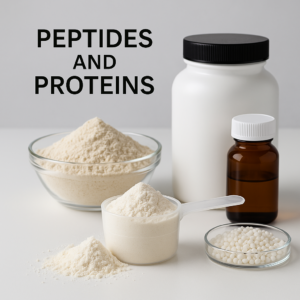Protein, Peptide & Amino Acid Testing Services
Laboratory Testing for Cosmetics and Dietary Supplements
 At Qalitex, we provide comprehensive testing for proteins, peptides, and amino acids, supporting quality control, regulatory compliance, and product integrity across the dietary supplement, functional food, cosmeceutical, and pet nutrition industries.
At Qalitex, we provide comprehensive testing for proteins, peptides, and amino acids, supporting quality control, regulatory compliance, and product integrity across the dietary supplement, functional food, cosmeceutical, and pet nutrition industries.
Our laboratory specializes in HPLC, LC-MS/MS, Kjeldahl, and amino acid profiling methods, delivering precise and reliable data for your finished products and raw materials. Whether you’re manufacturing a protein supplement, formulating a peptide-based anti-aging serum, or verifying amino acid ratios in a performance product, we provide the testing expertise you need.
Laboratory Testing Services
Protein Testing Services
We offer accurate quantification, identity verification, and purity analysis of protein-based ingredients, with a focus on dietary supplements and nutraceutical applications.
Services include:
Total protein content analysis (Kjeldahl, Dumas)
Protein type verification (e.g., whey, casein, soy, plant-based)
Label claim verification
Detection of protein spiking (e.g., creatine, glycine, taurine)
Allergen identification (soy, dairy, wheat)
Analytical Methods: Kjeldahl, Dumas, HPLC, ELISA
Standards Referenced: AOAC Official Methods, USP <1057>
Peptide Testing Services
Peptides are increasingly popular in both dietary supplements and cosmeceuticals. We test for identity, potency, purity, and stability, with full characterization for regulatory and commercial needs.
Services include:
Peptide structure and identity confirmation
Potency and dosage verification
Stability and shelf-life testing
Impurity and contaminant profiling
Custom peptide panels upon request
Analytical Methods: LC-MS/MS, HPLC, UHPLC, peptide mapping
Standards Referenced: ICH Q1A Stability Testing, USP <1047> Peptides
Performance-Enhancing Peptides (PEPs)
We offer specialized testing for performance and recovery-related peptides used in sports nutrition and anti-aging products. These include both regulated and investigational ingredients.
Peptides we commonly test:
BPC-157
TB-500 (Thymosin Beta-4)
Ipamorelin
GHRP-2 / GHRP-6
Sermorelin
Melanotan II
Why test performance peptides?
Many of these substances fall under FDA import alerts, DEA oversight, or WADA bans, making thorough testing and documentation essential.
Services offered:
Identity confirmation
Potency analysis
Impurity detection
CoA generation for international or B2B compliance
Regulatory References:
Amino Acid Testing Services
Amino acids are critical for functional foods, sports nutrition, and specialized diets. We test individual amino acids and full profiles for quality control, label claim verification, and formulation accuracy.
Amino acid services include:
Complete amino acid profiles
Branched-chain amino acid (BCAA) testing: leucine, isoleucine, valine
Essential and non-essential amino acid quantification
Free vs. bound amino acid differentiation
Tryptophan, taurine, lysine, methionine, arginine, and others
Analytical Methods: LC-MS/MS, ion-exchange chromatography, pre-column derivatization
Standards Referenced:
Industries Served
We provide protein, peptide, and amino acid testing services for a wide range of regulated and innovative industries, including:
Nutraceutical and dietary supplement companies
Sports nutrition and performance product brands
Cosmeceutical and skincare manufacturers
Functional food and beverage formulators
Pet and veterinary supplement producers
Exporters subject to global regulatory standards (EU, Canada, Middle East, Latin America)
Regulatory & Label Claim Support
Our testing supports compliance with multiple national and international regulatory frameworks. We provide clear documentation to support product claims, certifications, and audits.
Regulatory frameworks we align with:
FDA 21 CFR 111 (Good Manufacturing Practices for Dietary Supplements)
USP-NF Monographs
Health Canada Natural Health Products Regulations
EFSA requirements (Europe)
WADA prohibited substances standards
Compliance deliverables include:
Certificates of Analysis (CoAs)
Method validation reports
Shelf-life and stability documentation
Product specification sheets
Ingredient verification for import/export approval
Why Choose Qalitex Laboratory Services?
FDA-experienced scientific leadership
US-based lab with courier support and short lead times
Custom assay development and white-glove consultation
Regulatory partnership
ISO-aligned procedures and validated methods
B2B-focused, with specialization in small and mid-size supplement brands
Frequently Asked Questions (FAQ)
What is the difference between proteins, peptides, and amino acids?
Amino acids are the basic building blocks of peptides (short chains), which in turn are the building blocks of proteins (longer, folded chains with complex biological functions). All three are chemically related and are common ingredients in supplements and functional formulations.
Can I test for illegal or banned peptides?
Yes. We test for many peptides listed on the WADA prohibited list or under FDA scrutiny. While we do not provide legal clearance, our lab can confirm identity and purity to assist with compliance, formulation audits, or customs inspections.
Do you test for amino acid ratios or full profiles?
Yes. We offer both individual amino acid quantification and full amino acid profiling services, including the 20 standard amino acids, BCAAs, and conditionally essential amino acids.
Can you verify my label claims?
Yes. Our testing includes label claim verification services, where we compare your declared amounts of protein, peptides, or amino acids to the actual measured content and provide a detailed CoA and analysis.
How are peptides different from proteins in supplement products?
Peptides are typically synthetic or natural short-chain compounds used for targeted effects (e.g., anti-aging, muscle growth, recovery). Proteins are macronutrients like whey, casein, or soy. They require different analytical methods and regulatory documentation.
